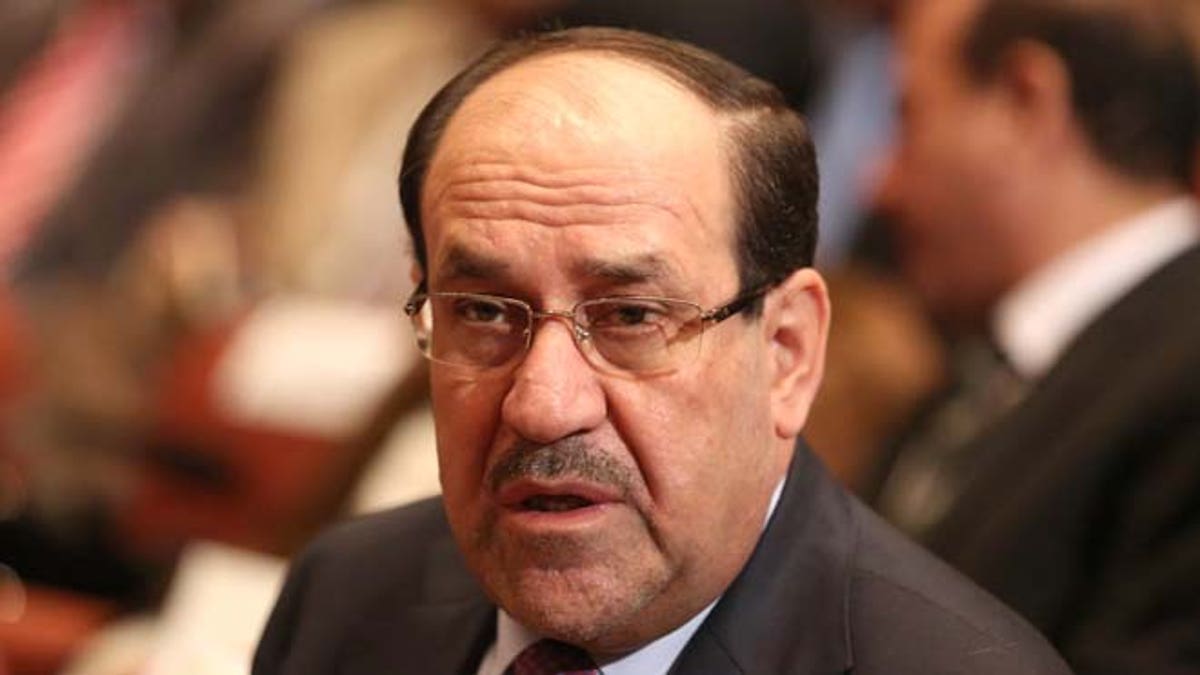
Sept. 8, 2014: Vice President Nouri al-Maliki, attends the Parliament session to submit his government in Baghdad, Iraq. (AP)
BAGHDAD – Iraq's new prime minister, Haider al-Abadi, has a daunting task ahead of him: With the world watching, the Shiite politician must unify a deeply divided country against Sunni militants who have seized much of its territory.
First, though, he must find officials to run the defense and interior ministries who will be acceptable to Iraq's parliament, which approved his Cabinet late Monday except for those positions along with a few lesser posts.
The Islamic State group's lightning advance across much of northern and western Iraq has driven hundreds of thousands of people from their homes since June, and prompted the U.S. to launch aid operations and airstrikes in hopes of boosting the waning efforts of Iraqi and Kurdish forces looking to regain control of lost territory.
The success of outreach efforts to Iraq's alienated Sunni minority will be a key part of international efforts to beat back the Islamic State militants, who also control parts of neighboring Syria.
Addressing lawmakers, al-Abadi said the central government, which includes all major religious and ethnic groups in Iraq, must make sure that cities and provinces have enough money to deliver basic services. He also emphasized the need to provide housing and education to more than a million people displaced by the militants' advance.
Like many positions in the Iraqi government, the job of defense minister has, in recent years, traditionally been assigned to a Sunni, while the interior minister has been a Shiite. Some lawmakers say the country is at too critical a juncture to put so much emphasis on sect.
"I have fears that the vacant posts, mainly the defense and interior, will be run without ministers or be given to persons affiliated with political parties instead of to people who are independent and professional," Hamid al-Mutlaq, a Sunni lawmaker from Anbar province, told
Al-Mutlaq called on al-Abadi's government to "prove its credibility and good intentions."
Salim al-Muslimawi, a Shiite lawmaker from Babil province, said any further delay in filling the defense and interior posts risks making the government appear weak and divided. He called the generally rapid selection of other Cabinet ministers "a positive step in tackling the many problems facing the country."
Another Shiite lawmaker, Walid al-Hili, said al-Abadi on Monday had the names of independent Sunni and Shiite candidates for both posts, but "didn't want to submit them without a national consensus. ... He'll submit them in the coming few days -- no more than a week."
Al-Abadi has yet to formally nominate anyone for the defense and interior posts, unable so far to find a consensus choice in discussions with various parliamentary blocs.
Al-Abadi became prime minister on Aug. 14, ending a political deadlock that had plunged the country into uncertainty as it fights the Sunni militant insurgency. He succeeded Nouri al-Maliki, Iraq's prime minister for the past eight years.
The U.S. and other countries have been pushing for a more representative government that will ease anger among Sunnis, who felt marginalized by al-Maliki's Shiite-dominated administration.
Sunni alienation helped fuel the Islamic State extremist group, which seized the country's second largest city, Mosul, and routed Iraq's beleaguered armed forces. Thousands of people have been killed and more than 1.5 million have been displaced by the violence.
"Al-Abadi will have a hard time achieving anything because he'll likely be forced to play defense most of the time," said Ramzy Mardini, an Iraq expert with the Atlantic Council. "Another challenge will be how to form a new security architecture that includes demobilizing Shiite militias, integrating Sunnis back into the security sector and figuring out what kind of sectarian balance and role they will play within the security forces."
Another player is the country's ethnic Kurdish population, which has long pressed for independence but is now joining Iraqi security forces to fight the Sunni extremists.
"We have a three-month timeline," said Falah Bakr, the minister of foreign affairs for the semi-autonomous Kurdish Regional Government in northern Iraq.
"If there is political will in Baghdad, if they are for this genuine partnership and power sharing, and if they care for a better future for Iraq, then this is the way," Bakr told The Associated Press. "Either we share the power, or we cannot live together."




















